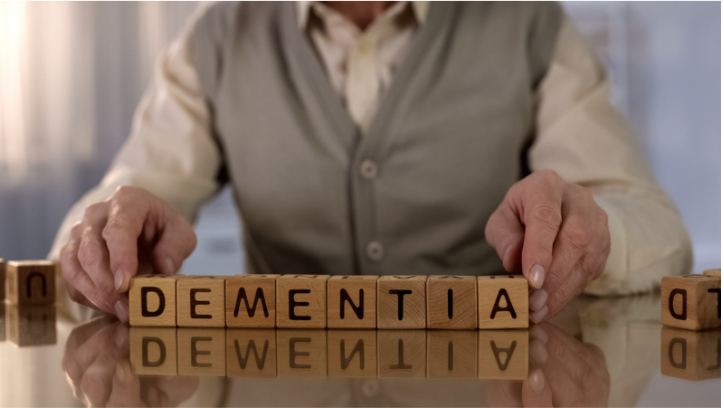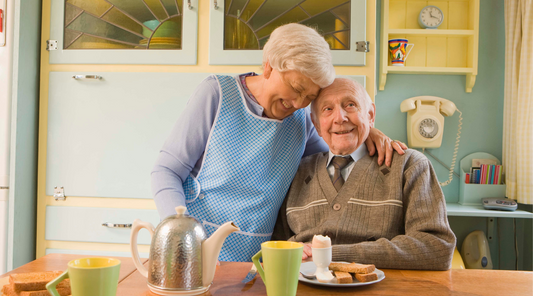
The Stages of Dementia
Share
How to support your loved one through the stages of dementia
What is Dementia?
When a loved one’s ability to think straight, reason, and remember things begins to impact their day-to-day functioning, it is reflective of dementia. The stages of dementia are generally broken up into three categories: mild, moderate, and severe. No matter what your loved one’s ability level is, there are always opportunities for them to enjoy life and improve their quality of life. At every stage, there are proactive measures that can slow decline. Some general ways to promote brain function include: regular physical activity, sleep, healthy diet, interacting with others, engaging in tasks that are failure-free. Let’s take a look at each stage and what you can do to support your loved one.
The stages of dementia explained
Mild Stage
At the mild stage, your loved one may withdraw from activities or conversations more often, becoming quieter than what was typical for them. They can still hold a conversation and this may cover up their deficit. Their success with complex tasks that were once easy now show a decline. For example, struggling with cleaning the house, paying bills, following a new recipe, or managing the changes in medication routines. These tasks may take extra time and have more errors. They typically repeat questions or stories at this level. Their speech also shows increased confusion as they may struggle with word-finding or lose their train of thought in a conversation. It is harder for them to adjust to a change in their daily routine which can come across as inflexible. Driving is no longer safe at this level. They tend to notice what is right in front of them, but less so to the sides.
They tend to be aware of their deficit and it is painful for them to deal with. This can result in denial as a coping mechanism. Their response time to what is said is often 2-3 times longer. If they are living alone, they will need some drop-in help from caregivers to ensure their safety and that their needs are being met.
How to help someone with mild dementia?
To help your loved one that is functioning at this level, it is important to give them enough time to respond when talking to them. Their brain needs more time to process what is said. It’s beneficial to help them maintain a daily routine where they can wake up and know what to expect of their general sequence of the day. When they’re struggling with a task, provide subtle support and cues so they are more successful in areas they struggle. For example, if they can’t figure out which way to get their shirt on, set it in the right orientation for them. Use visual reminders to help them find things, such as labeling drawers or providing a written schedule and the use of a calendar. It is important that they get daily exercise and that they are meaningfully engaged in tasks at their ability level. Try doing a simple puzzle with them or provide them with magazines on subjects they enjoy.
Moderate Stage
As the severity of the disease progresses, people living with dementia progress to moderate dementia. They are no longer safe to live alone and can’t survive without the assistance of others.
What to expect in middle stage of dementia?
They tend to:
- Struggle to manage dressing, bathing, grooming, and toileting with good quality on their own, and depend more and more on the help of others to achieve good quality
- Become unable to recall major aspects of their life, such as the name of their high school or college
- Change their clothing often, or not at all, or choose odd clothing combinations.
- Eat slowly
- Resist the help of a caregiver
- Have poor safety awareness and judgment
Their ability to use objects in a meaningful way also declines during this stage. In the early phase of moderate dementia, they would be able to see a toothbrush and know to brush their teeth with it, but in the later stage of moderate dementia, they may not know what to do with the toothbrush.
How to someone in the middle stage of dementia?
To support your loved one functioning at this level, provide the physical and verbal cues they need to be successful with their daily care tasks. Aim for subtle cues, allowing them to do what they can safely do on their own. Keep them engaged with physical activity to maintain their strength and balance. For example, go for a daily walk even if it’s indoors walking from one end of the house to the other. Help provide meaningful, stimulating activities at their ability level. This can help reduce problem behaviors. They are likely to enjoy reminiscing, although their ability to talk is declining. Providing structure and routine to their day helps them to anticipate what will happen next. Speak to them directly in front of them, in simple terms, in a caring manner. Approach them gently, as they tend to startle easily.
Severe Stage
At the severe stage of dementia, they are still aware of their name. Speaking may be reduced to just a few words each day. Their brain struggles to tell their body what to do and they lose the ability to use common objects. Gradually the abilities to self-feed, sit up, walk, and smile are lost.
How to help someone at the final stage of dementia?
They will follow single-word directions at this stage better than full sentences. Physical exercise might include walking, moving from sitting to standing repeatedly for strengthening, or balloon-batting, but their ability to participate declines throughout this stage. Stimulation can be provided through the senses such as music they enjoy, calming smells, furry stuffed animals, gentle massage. Aim to enjoy and create moments of connection with them. Give them a gentle hand massage. Read them a simple story. Let them enjoy a pet. Be present with them as they are aware of you, but are unable to tell you how they feel.






